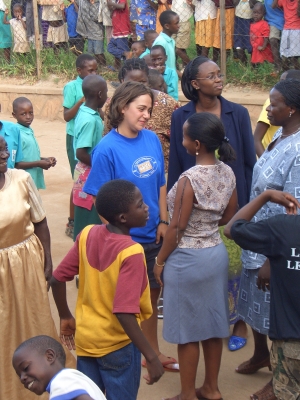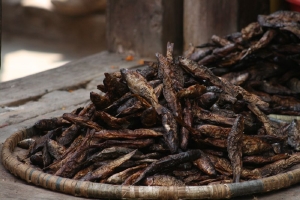Global Citizenship: Don't just fund raise and donate cash
Today, more than ever before, our lives are linked to the lives of other people whom we never meet or know. We expect services at home and at work, such as power, water, telephones and the Internet. We eat foods produced thousands of miles away, drink exotic fruit juices, eat fruits grown in tropical regions and power our music player with batteries containing rare metals mined in China, Russia and Africa.
 |
|---|
Bananas growing in Uganda |
When we throw away a bunch of bananas , we don’t think of the wasted effort to grow then, the carbon emissions that were created by shipping them half way round the planet, or that the land on which they were grown could have been used by a poor farmer to grow food for his family. We just throw them away because they aren’t quite perfect, or because we don’t fancy bananas any more.
That is one example out of hundreds, showing how our lives and actions here, are linked with, and have effects on, lives elsewhere around the world.
We use 200 times as much electricity per person in the UK than is used in Uganda, but Uganda will suffer the effects of global warming just as much as any European country will. Africa produces only 3 percent of global carbon emissions but nature won’t arrange for it to suffer only 3 percent of the consequences.
 |
|---|
Garments being made in Nepal |
When we buy a dirt cheap T shirt, do we wonder why it is so cheap? If we did think about it, we’d realise that to keep things cheap for us, manufacturer’s costs have to be kept down, and that usually means paying as little as possible to the people who make things. If a company can make a profit on a £2.00 T shirt, after transporting it all the way from India, packing it, displaying it, and paying shop staff, how much do you think the person who made that shirt was paid? 10p perhaps?
Giving Aid and Relief to developing countries isn’t simply a matter of donating money and supporting schemes to provide clean water and sustainable agriculture, its about treating other people with respect, and understanding them.
We are a global community and we need to act like global citizens.
Here are a few thoughts on how you can take an active role as a global citizen and help to make a difference around the planet, without waiting until somebody sticks a collecting tin under your nose…
Be Aware:
There is a saying that ‘ignorance of the law is no excuse’. It means that when you do something wrong, you can’t just say that you didn’t know it was wrong. You should find out the consequences of your actions before you do things.
Ignorance of the global consequences of what you do shouldn’t be an excuse either. People who make themselves aware of problems can help solve them; people who ignore problems often make them worse.
So, read on and learn about what you can do to be a good global citizen, then tell all your friends too.
Use Energy Wisely:
When we use energy produced from fossil fuels, we add to the emissions of carbon that are linked to global warming. Thus, boiling a kettle, using the car, keeping the central heating at tropical levels will all add to the global warming problem.
Unfortunately, global warming is exactly that- it’s global. Its not limited to the places that cause it, so if you keep boiling a full kettle and making only one cup of coffee, the waste won’t result in your house being flooded or over heated- it will go towards a planet wide change. And whilst you can cope with a few extra degrees of warmth in chilly UK, if you happen to be in a dry and drought ridden area already, those few extra degrees will kill your crops, your animals, and then kill you.
Africa produces only 3 percent of global carbon emissions but it is already suffering the consequences of the 97 percent produced by the rest of the world.
If you turn off unwanted light bulbs, turn down the heating, only use the car when you really need to, and boil just one cup of water when you want just one cup of coffee, you will be reducing the climatic damage in ‘at risk areas’, making it easier for farmers to keep their crops growing and their animals alive. With crops and animals they can earn a living, get education, health care and food.
Empathise with people:
 |
|---|
| Understand people- be friends with them |
That means trying to understand how they live, feel and think. Millions of people on planet Earth live on less than 50p per day. That’s 50p for perhaps a 12 hour working day. It will buy rice for a small family in India, a good pot full of beans in Mexico, or enough bananas to make Matoke for a family in Uganda. How far could you get on 50p per day? How much food could you buy – would it be enough to live on?
When sending your four children to school will cost 50p a day, and food for the family will cost the same, which would you choose? How easy is it to say that ignorant African farmers should send their children to school, when doing so would mean starving them and the whole family? What if you paid a little more for your exotic fruit juice or bananas, would the extra cost kill you? Of course it wouldn’t, but whilst you insist on paying as little as possible, and spending the rest on the cinema or going out, how would you explain that your fun is more important that a family being fed and their children getting an education? Can you imagine how they would feel, seeing you well fed and penny pinching whilst they starve?
Reduce, Repair and Recycle:
We are used to throwing things away when they stop working, or go out of fashion. We are slowly becoming more used to recycling, but we still waste too much. Clothing that no longer fits, or is out of fashion, is still good clothing. Why not make sure it is recycled or sent to a charity shop who can turn it into money to help Aid projects?
Old mobile phones often still work, or can be repaired. A teacher in Katine doesn’t need a video phone, with mp3 player and ten games – she needs a way to contact other teachers, the doctor and the mechanic. When you get rid of your phone because it doesn’t have the latest add ons, don’t bin it- recycle it so it can be useful somewhere else.
Reduce the quantity of cosmetic products you use. Yes, they often contain palm oil, and oil palms are planted across the tropics just to provide you with skin care lotion, posh soaps and cosmetics. When oil palms are planted, food crops are no longer being grown, and the profits go to the big companies, not the small scale palm growers. If you reduce your consumption of palm oil products, more land is available for growing food crops that farmers can eat or sell in local markets.
Support Fair Trade:
Fair Trade is all about making sure that producers such as farmers and people sewing shirts and footballs get paid a reasonable wage for their efforts. You can buy loads of different Fair Trade items in the UK, from coffee and chocolate to shirts and shoes.
Fair Trade companies guarantee that the people making the goods receive a wage that is fair. That means that Fair Trade goods often cost a little more, but the extra cost is going direct to the people who deserve the money, not the companies in the middle who exploit low wages in developing countries.
Buy Food:
If you buy foods imported from LEDC’s, try to buy Fair Trade products. Make sure that as much of your money as possible goes back to the growers. Buy what you need and avoid waste. Just imagine the waste there is when something like vegetables are shipped all the way from Uganda to the UK, only to be thrown away because you bought more than you needed. It’s not just the vegetables, it’s the fuel used to transport them, the labour to harvest them, and the land needlessly used to grow them. By using what you buy, you ensure that pointless carbon emissions are avoided, and you then reduce global warming.
Travel and Tourism:
 |
|---|
Eat local foods and learn local customs |
There are good arguments against using aircraft to jet off on holiday, but it seems pretty certain that we will carry on doing it. So, when you arrive at a distant location, what can you do to be a good global citizen?
Become aware of the place you are in. Don’t sit in the hotel surrounded by the things you would have at home, and eating familiar foods in the hotel restaurant. Get out and discover the culture, the people and the life styles of your host country. Learn something about the place, what it’s like to live there, to work there and to travel there. Try the local food and spend money in local shops.
It’s an accepted fact of life that we find it hard to hurt friends, and find it much easier to hurt or ignore people we’ve never met. If you have chatted with a girl who is bright, articulate and would easily get a good job in the UK, but you know she will never finish school because of the costs, you will discover that she is no different to you. She can work as hard as you, harder even, and be brighter, but if she doesn’t get an education, if she falls ill without medical care, or can’t work because the electricity is cut in the only factory, you will know it’s not her fault. She can try as hard as anyone, but if the opportunities are denied to her, she can’t succeed.
She is not a faceless person who is happy to do nothing and live off foreign aid, she is you but without your opportunities.
![]()